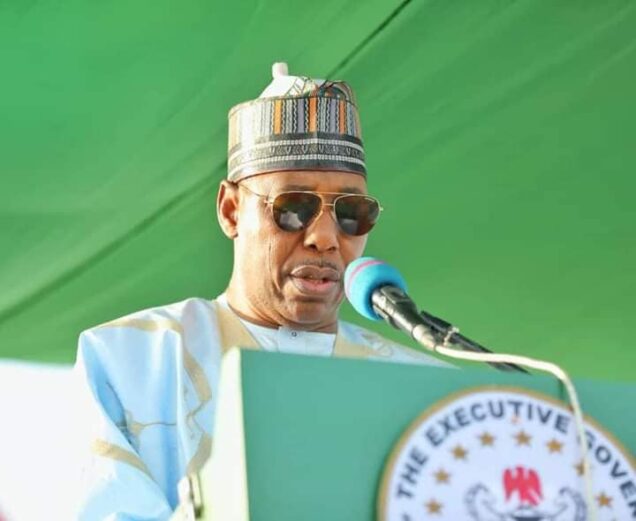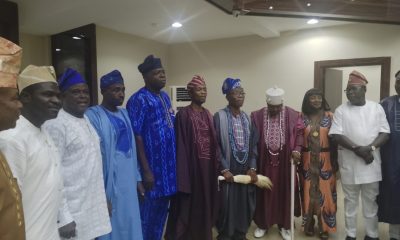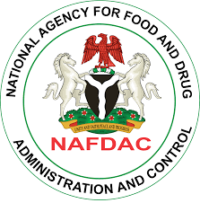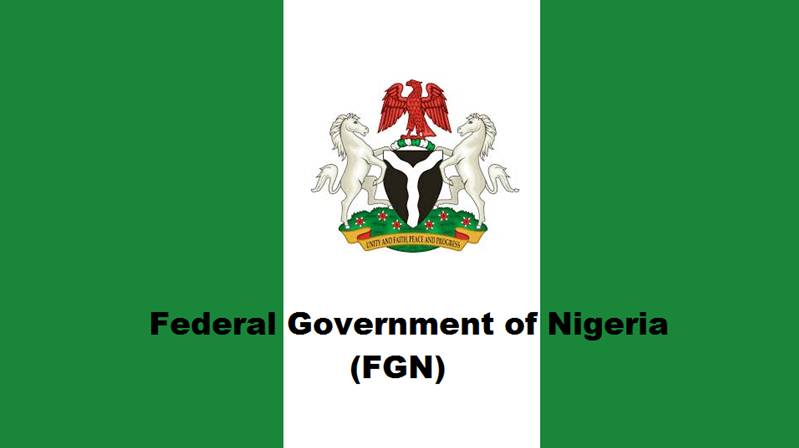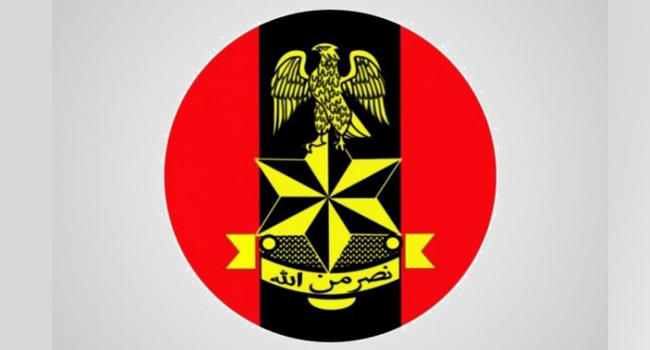Headlines
Days of Drug Abuse in Nigeria Are Numbered, Says VP Osinbajo

Nigeria’s Vice President, Prof. Yemi Osinbajo has assessed the current war being waged against illicit drugs in the country and declared that the days of drug abuse were numbered in Nigeria.
Speaking on Monday in Abuja, on the occasion of the 2022 United Nations International Day Against Drug Abuse and Illicit Drug Trafficking which had as its theme: “Addressing Drug Challenges in Health and Humanitarian Crises,” Osinbajo flayed the prevailing menace of drug abuse in Nigeria, which he said portends grave consequences for young people and undermines the security of the country
He, however said the nation was winning the drug war, adding that the days of the scourge of drug abuse and dependency in the country were numbered.
The vice president’s optimism was premised on the renewed vigour of the National Drug Law Enforcement Agency (NDLEA), the commitment of the Federal Government and the support of development partners.
According to him: “We are winning this war. The days of the scourge of drug abuse and dependency are clearly numbered, but it will involve even greater investment in focus and determination for the long haul,” according to the Vice President.
“The NDLEA especially in the last two years under the dynamic leadership of General Buba Marwa, the NDLEA Chairman, has been fiercer and sharper in its determination to stamp out drug abuse and trafficking in the country. His vision and strong resolve have given the war against drug trafficking and abuse new energy, purpose and clearer direction.
“I am glad to hear that in 2021, about 8,000 drug users were counselled and rehabilitated by the NDLEA, and in the first half of this year alone, over 11,000 drug users have been counselled and treated. We must maintain a multi-dimensional and holistic approach to tackling drug abuse.”
Commenting on the approach that ensures the realisation of the objective, Osinbajo said, “the new normal offers us opportunities for increased innovation in tackling this menace, through technology-based monitoring systems for promptly detecting and addressing drug market changes; and also accelerating mobile outreach programmes, remote consultation, and treatment for those who suffer from drug use disorders and are without the appropriate care.”
He noted that in as much as the federal government through its agencies and the state governments would lead the charge with decisive policy initiatives, the strides must be complemented by changes at the family and community level.
“The kind of change we seek regarding drug abuse cannot happen without the collaboration of families, faith-based organisations and community leadership at the local levels.”
Osinbajo, therefore, noted that a society free of drug criminals was achievable by, “relentlessly breaking illicit drug supply chains and distribution networks; discouraging drug use through intensive outreach and sensitisation; and also promptly prosecuting traffickers.”
He added that: “We must intensify rehabilitation of drug addicts, because what we are faced with is indeed a public health crisis — a crisis that is taking lives, destroying families and shattering communities.”
According to the vice president, drug abuse and illicit drug trafficking has become a global public health and socio economic challenge, which places a huge burden on the Nigeria’s health care system, with, “grave consequences for young people and the productivity of our labor force,” undermining the security of communities.
Osinbajo made specific reference to a United Nations Office for Drug and Crime (UNODC) report which said, “drug use was responsible for the death of almost half a million people in 2019. And drug use disorders resulted in the loss of 18 million years of healthy life.”
“The 2018 National Drug use survey also revealed that Nigeria at the time that there were about 14.3 million drug users, of which close to 3 million suffer from drug use disorder.
“This figure represents a 14.4 per cent prevalence rates in Nigeria, which is about three times the global average prevalence rate of five per cent. The UNODC also in its 2021 World Drug Report projects that by 2030 the number of people using drugs around the world will rise by 11 per cent and by 40 per cent in Africa alone causes a disturbing projection because as the country with the largest population in Africa, this implies that Nigeria’s use of drug abuse prevalence will rise substantially especially considering the proportions that we are leaders in terms of population.”
“And the past 17 months, the elderly we are told has recorded over 17,647 arrests of offenders including 10 drug barons and I’m sure that that number increases everyday if you’re following the news, with over 2369, convicted persons and over 150,000 kilograms of drugs that have been seized within the same period. So the statistics show that 5.5 per cent of the population aged between 15 and 64 years used drugs at least once since 2018. This is precisely the age bracket that we cannot afford to lose to drugs.”
Osinbajo, while lamenting the increasing trends of drug abuse in areas of conflict and in post conflict settings, such as in IDP and refugee camps, said the development was a special concern to Nigeria, especially as the country is in the throes of civil conflict and terrorism, resulting in the displacement of large numbers of our population.
He said young people who are usually the most vulnerable to drug, also form the majority of armed combatants and the resultant widespread use of drugs by the terrorists.
“Indeed, some studies have shown that after controlling for armed groups and individual level variables, drug intake and alcohol consumption, sharply increase the violent actions perpetrated during conflicts.
“For women and girls in particular, the situation is more harrowing. They’re exposed to severe traumatic situations. Due to violence, and sometimes sexual exploitation, especially in camps, which together with other stressful factors of displacement can lead to drug use. These problems are all worsened by the expected lack of access to treatment and therapies for drug abuse in refugee or IDP camps.”
Against this background, the vice president said the federal government had also taken both specific and general actions over the past seven years, all directed at trying to control or deal with the menace of illicit drug trafficking in Nigeria in particular.
These actions, Osinbajo said, include adopting a synergized and multi-agency approach, adding, “the government has deployed counterterrorism and Counter Narcotics initiatives led by the NDLEA which have successfully disrupted several high profile drug networks. And as part of these efforts with the funding from the European Union, and technical support from the UNODC relevant MDAS and civil society organisations, were rolled out by the National Drug Control master plan for 2021 to 2025.
“This plan itself leverages an extensive evidence base, including the very first National Drug Use Survey which was conducted by the National Bureau of Statistics in 2018.
“The master plan adopts a comprehensive and inclusive approach to addressing issues of drug supply reduction, issues of drug abuse and it has it is based on four thematic pillars, drug supply reduction, demand reduction, access to drug on medical purposes, and governance and coordination.
“The plan is not just an approach majorly targeted at drug supply reduction, is a much more balanced plan and it is much more health centered and looks at drug control not just from the point of view of abuse but also from a health perspective.”
Meanwhile, the NDLEA has commenced measures aimed at improving access to treatment, care and rehabilitation in order to stave off the public health problems that are drug abuse-related as part of radical reforms in the fight against abuse in the country,
Chairman/Chief Executive Officer, Brig Gen Mohamed Buba Marwa (rtd), earlier in his welcome address, revealed the arrest of 10 major drug barons which he said have already been “taken out of circulation” with many more on the NDLEA’s watchlist along with their foot soldiers.
Marwa said the agency had been involved in a series of training, including on Drug Prevention, Treatment and Care (DPTC) for the officers, “to refocus from the criminalisation of drug users to provide the full gamut of health services for them.”
According to him, the agency has this year alone, counselled and rehabilitated 3, 523 drug users mostly through brief interventions in its facilities.
“We also extended the DPTC training to several NGOs to empower them with the requisite skills and knowledge to cascade the effect to communities and the grassroots.
“Given the dearth of treatment facilities in the country, it will be impossible to make the kind of gains we are targeting. To this end, we proposed the establishment of model rehabilitation centres to further make treatment accessible and affordable to more people. The good news is that President Muhammadu Buhari graciously, with the support of the National Assembly, approved the establishment of six rehabilitation centres across the country, three of which have been approved in this year’s budget.
“We didn’t stop there. We’re also lobbying the private sector, by encouraging the leading lights in the business community to build or contribute to the development of rehabilitation centres as part of their corporate social responsibility. In this respect, we have gotten some positive, concrete responses as well as strong commitments from other quarters.”
Also speaking, Chairman of MTN Foundation and former Minister of Health, Julius Adelusi-Adeluyi, said the Foundation would continue to support the NDLEA in its effort to rid the country of illicit drugs.
Ondo NDLEA Seizes 30,000kgs of Drugs, Arrests 294 Suspects in One Year
In a related development, the NDLEA, Ondo Command yesterday disclosed that it had seized about 30,000kgs of drugs from June 2021 to date.
The State Commander of NDLEA, Mr. Kayode Raji, stated this in Akure, during a sensitisation and road walk, organised to commemorate the United Nations International Day Against Drug Abuse and Illicit Drugs Trafficking.
Raji said marijuana, puff Shisha, alcoholic drinks and other deadly mixtures, such as “scoochies or skushis” topped the list of the most consumed substances among the youths in the state.
He noted that other deadly drugs and substances the teenagers also abuse included Rohypnol, “Ref” as they call it, “gegemu”, Arizona and Loud, believed to be enhanced Marijuana that produce stronger effect than the regular one.
He said: “We have made over 30,000 kgs of various hard drugs. We have arrested 294 suspects and out of these, about 65 have been sentenced to various jail terms.
“We have arrested some people who felt hitherto, they were untouchable and we are still doing more. As a matter of fact, it is gratifying to say that our greatest achievement are the people we’ve taken off drugs.”
He also revealed that the command had counselled over 60 drug addicts and rehabilitated them back to the society as normal human beings.
“Some have been reintegrated back to the society and some of them have even gotten jobs. About three weeks ago, one of the people we rehabilitated in our facility came to give a testimony that he just secured a job in Dubai. It shows that we can do it.
“We have synergy with higher institutions across the state and we’ve gone to various schools for sensitisation through persuasion and as well, instituted War Against Drug Abuse (WADA) clubs”, Raji stressed.
“So, drug is evil, it portends evil, it has no good. We are urging everybody to stay from drugs. There is no small or big drug. Starting from cannabis Colorado, monkey tail, Scoochies amongst others.
“We want people to stay away from it, especially in this part of the country, Scoochies and monkey tail, people see it as giving them energy and boost. It is not good for their health because it spoils their liver, kidney and all parts of their body, ultimately leading to untimely death”, Raji added.
Headlines
Noble Ladies Champion Women’s Financial Independence at Grand Inauguration in Abuja

Women from diverse backgrounds across Nigeria and beyond gathered at the Art and Culture Auditorium, Abuja, for the inauguration and convention of the Noble Ladies Association. The event, led by the association’s Founder and “visionary and polished Queen Mother,” Mrs. Margaret Chigozie Mkpuma, was a colourful display of feminine elegance, empowerment, and ambition.
The highly anticipated gathering, attended by over 700 members and counting, reflected the association’s mission to help women realise their potential while shifting mindsets away from dependency and over-glamorization of the ‘white collar job.’ According to the group, progress can be better achieved through innovation and creativity. “When a woman is able to earn and blossom on her own she has no reason to look at herself as a second fiddle,” the association stated.
One of the association’s standout initiatives is its women-only investment platform, which currently offers a minimum entry of ₦100,000 with a return of ₦130,000 over 30 days—an interest rate of 30 percent. Some members invest as much as ₦1 million, enjoying the same return rate. Mrs. Mkpuma explained that the scheme focuses on women because “women bear the greater brunt of poverty” and the platform seeks “to offer equity in the absence of economic equality.”
Education is also central to the Noble Ladies’ mission, regardless of age. Their mantra, “start again from where you stopped,” encourages women to return to school or upgrade their skills at any stage in life. The association believes that financial stability is vital in protecting women from cultural practices that dispossess widows of their late husbands’ assets, while also enabling them to raise morally and socially grounded families.
Founded on the vision of enhancing women’s skills and achieving financial stability, the association rests on a value system that discourages pity and promotes purpose. “You have a purpose and you build on that purpose to achieve great potentials and emancipation,” Mrs. Mkpuma said.
A criminologist by training and entrepreneur by practice, she cautions against idleness while waiting for formal employment. “There are billions in the informal and non-formal sectors waiting to be made,” she said, rejecting the “new normal of begging” and urging people to “be more introspective to find their purpose in life and hold on to it.”
Mrs. Mkpuma’s management style keeps members actively engaged, focusing on vocational skills and training to prepare them for competitive markets. She is exploring “innovative integration of uncommon technologies” and is already in talks with international franchises to invest in Nigeria, with Noble Ladies as first beneficiaries.
The association’s core values include mutual respect, innovation, forward-thinking, equal opportunity, and financial emancipation. With plans underway to establish a secretariat in the heart of Abuja, the group aims to expand its impact.
The event drew high-profile guests, including former Inspector General of Police, Mike Okiro, and a host of VIPs, marking a significant milestone in the association’s drive for women’s empowerment.
Headlines
NEPZA, FCT agree to create world-class FTZ environment

The Nigeria Export Processing Zones Authority (NEPZA) has stepped in to resolve the dispute between the Federal Capital Territory Administration and the Abuja Technology Village (ATV), a licensed Free Trade Zone, over the potential revocation of the zone’s land title.
Dr. Olufemi Ogunyemi, the Managing Director of NEPZA, urged ATV operators and investors to withdraw the lawsuit filed against the FCT administration immediately to facilitate a roundtable negotiation.
Dr. Ogunyemi delivered the charge during a courtesy visit to the Minister of the Federal Capital Territory, Barrister Nyesom Wike, on Thursday in Abuja.
You will recall that the ATV operators responded to the revocation notice issued by the FCT administration with a lawsuit.
Dr. Ogunyemi stated that the continued support for the growth of the Free Trade Zones Scheme would benefit the nation’s economy and the FCT’s development, emphasizing that the FCT administration recognized the scheme’s potential to accelerate industrialisation.
Dr. Ogunyemi, also the Chief Executive Officer of NEPZA, expressed his delight at the steps taken by the FCT minister to expand the economic frontier of the FCT through the proposed Abuja City Walk (ACW) project.
Dr. Ogunyemi further explained that the Authority was preparing to assess all the 63 licensed Free Trade Zones across the country with the view to vetting their functionality and contributions to the nation’s Foreign Direct Investment and export drives.
“I have come to discuss with His Excellency, the Minister of the Federal Capital Territory on the importance of supporting the ATV to succeed while also promoting the development of the Abuja City Walk project. We must work together to achieve this for the good of our nation,” he said.
On his part, the FCT Minister reiterated his unflinching determination to work towards President Bola Ahmed Tinubu’s Renewed Hope Agenda by bringing FDI to the FCT.
“We must fulfil Mr. President’s promises regarding industrialization, trade, and investment. In this context, the FCT will collaborate with NEPZA to review the future of ATV, a zone that was sponsored and supported by the FCT administration,” Wike said.
Barrister Wike also said that efforts were underway to fast-track the industrialisation process of the territory with the construction of the Abuja City Walk.
The minister further said the Abuja City Walk project was planned to cover over 200 hectares in the Abuja Technology Village corridor along Airport Road.
According to him, the business ecosystem aimed to create a lively, mixed-use urban center with residential, commercial, retail, hospitality, medical, and institutional facilities.
He added that the ACW would turn out to be a high-definition and world-class project that would give this administration’s Renewed Hope Agenda true meaning in the North-Central Region of the country.
Barrister Wike also indicated his continued pursuit of land and property owners who failed to fulfil their obligations to the FCT in his determination to develop the territory.
Headlines
Benue IDPs block highway, demand return to ancestral homes

Vehicular movement along the Yelwata axis of the Benue–Nasarawa highway was brought to a standstill on Wednesday as Internally Displaced Persons, IDPs, staged a protest, demanding immediate return to their ancestral homes.
The protesters, believed to be victims of persistent attacks by suspected herdsmen, blocked both lanes of the busy highway for several hours, chanting “We want to go back home”.
The protest caused disruption, leaving hundreds of motorists and passengers stranded.
Eyewitnesses said the displaced persons, many of whom have spent years in overcrowded IDP camps, are expressing deep frustration over the government’s delay in restoring security to their communities.
“We have suffered enough. We want to return to our homes and farms,” one of the protesters told reporters at the scene.
Security personnel were reportedly deployed to monitor the situation and prevent any escalation, though tensions remained high as of press time.
Efforts to reach the Benue State Emergency Management Agency, SEMA, and other relevant authorities for comment were unsuccessful.
-

 Headlines4 years ago
Headlines4 years agoFacebook, Instagram Temporarily Allow Posts on Ukraine War Calling for Violence Against Invading Russians or Putin’s Death
-

 Headlines4 years ago
Headlines4 years agoNigeria, Other West African Countries Facing Worst Food Crisis in 10 Years, Aid Groups Say
-

 Foreign3 years ago
Foreign3 years agoNew York Consulate installs machines for 10-year passport
-

 News1 year ago
News1 year agoZero Trust Architecture in a Remote World: Securing the New Normal
-

 Entertainment3 years ago
Entertainment3 years agoPhyna emerges winner of Big Brother Naija Season 7
-

 Headlines1 year ago
Headlines1 year agoNigeria Customs modernisation project to check extortion of traders
-

 Entertainment2 years ago
Entertainment2 years agoMovie download platform, Netnaija, announces closure
-

 Economy2 years ago
Economy2 years agoWe generated N30.2 bn revenue in three months – Kano NCS Comptroller



